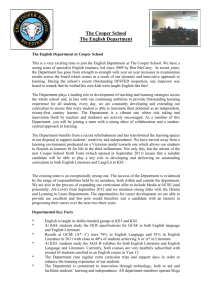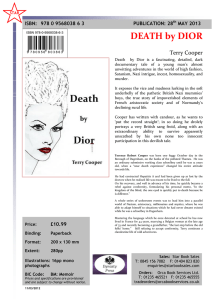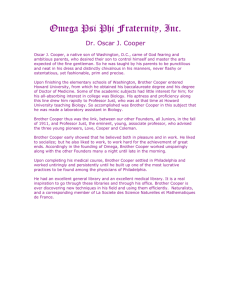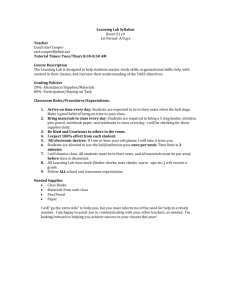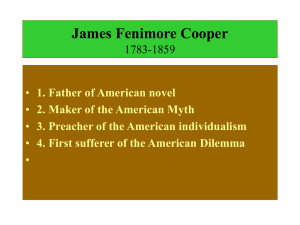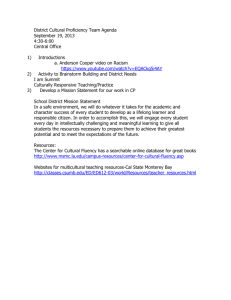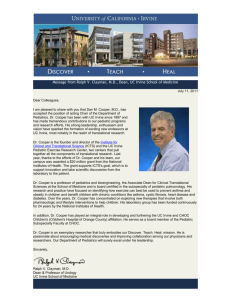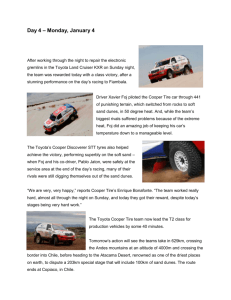Page 1 LEXSEE 183 FRD 135 COOPER HOSPITAL
advertisement
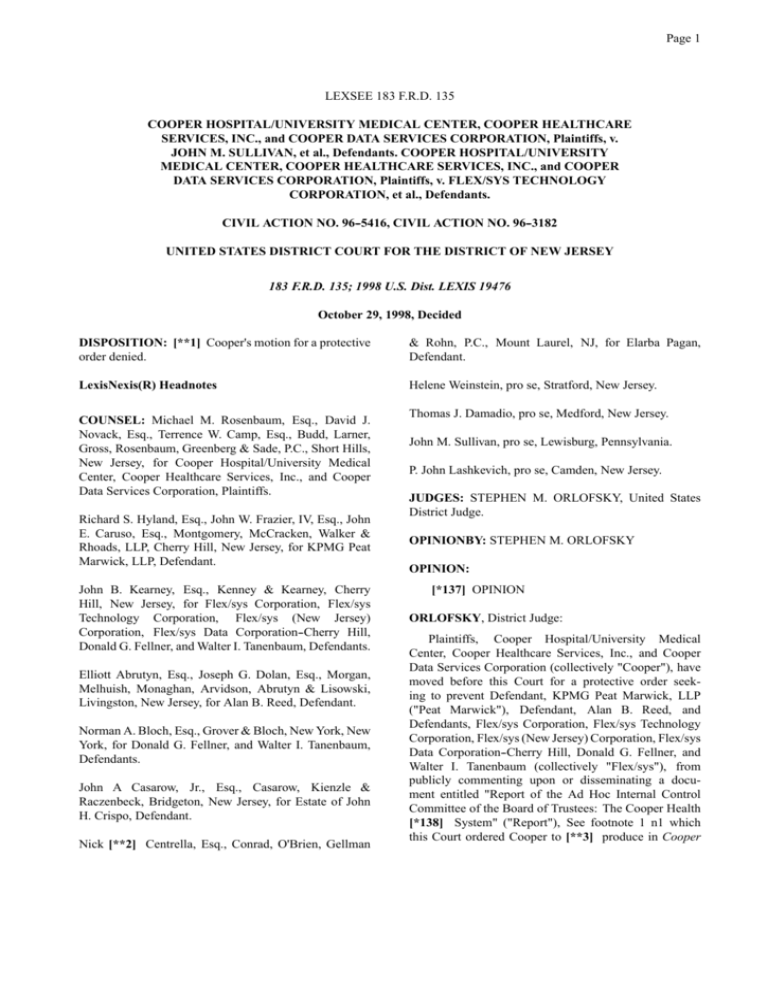
Page 1 LEXSEE 183 F.R.D. 135 COOPER HOSPITAL/UNIVERSITY MEDICAL CENTER, COOPER HEALTHCARE SERVICES, INC., and COOPER DATA SERVICES CORPORATION, Plaintiffs, v. JOHN M. SULLIVAN, et al., Defendants. COOPER HOSPITAL/UNIVERSITY MEDICAL CENTER, COOPER HEALTHCARE SERVICES, INC., and COOPER DATA SERVICES CORPORATION, Plaintiffs, v. FLEX/SYS TECHNOLOGY CORPORATION, et al., Defendants. CIVIL ACTION NO. 96--5416, CIVIL ACTION NO. 96--3182 UNITED STATES DISTRICT COURT FOR THE DISTRICT OF NEW JERSEY 183 F.R.D. 135; 1998 U.S. Dist. LEXIS 19476 October 29, 1998, Decided DISPOSITION: [**1] Cooper's motion for a protective order denied. & Rohn, P.C., Mount Laurel, NJ, for Elarba Pagan, Defendant. LexisNexis(R) Headnotes Helene Weinstein, pro se, Stratford, New Jersey. COUNSEL: Michael M. Rosenbaum, Esq., David J. Novack, Esq., Terrence W. Camp, Esq., Budd, Larner, Gross, Rosenbaum, Greenberg & Sade, P.C., Short Hills, New Jersey, for Cooper Hospital/University Medical Center, Cooper Healthcare Services, Inc., and Cooper Data Services Corporation, Plaintiffs. Richard S. Hyland, Esq., John W. Frazier, IV, Esq., John E. Caruso, Esq., Montgomery, McCracken, Walker & Rhoads, LLP, Cherry Hill, New Jersey, for KPMG Peat Marwick, LLP, Defendant. John B. Kearney, Esq., Kenney & Kearney, Cherry Hill, New Jersey, for Flex/sys Corporation, Flex/sys Technology Corporation, Flex/sys (New Jersey) Corporation, Flex/sys Data Corporation--Cherry Hill, Donald G. Fellner, and Walter I. Tanenbaum, Defendants. Elliott Abrutyn, Esq., Joseph G. Dolan, Esq., Morgan, Melhuish, Monaghan, Arvidson, Abrutyn & Lisowski, Livingston, New Jersey, for Alan B. Reed, Defendant. Norman A. Bloch, Esq., Grover & Bloch, New York, New York, for Donald G. Fellner, and Walter I. Tanenbaum, Defendants. John A Casarow, Jr., Esq., Casarow, Kienzle & Raczenbeck, Bridgeton, New Jersey, for Estate of John H. Crispo, Defendant. Nick [**2] Centrella, Esq., Conrad, O'Brien, Gellman Thomas J. Damadio, pro se, Medford, New Jersey. John M. Sullivan, pro se, Lewisburg, Pennsylvania. P. John Lashkevich, pro se, Camden, New Jersey. JUDGES: STEPHEN M. ORLOFSKY, United States District Judge. OPINIONBY: STEPHEN M. ORLOFSKY OPINION: [*137] OPINION ORLOFSKY, District Judge: Plaintiffs, Cooper Hospital/University Medical Center, Cooper Healthcare Services, Inc., and Cooper Data Services Corporation (collectively "Cooper"), have moved before this Court for a protective order seeking to prevent Defendant, KPMG Peat Marwick, LLP ("Peat Marwick"), Defendant, Alan B. Reed, and Defendants, Flex/sys Corporation, Flex/sys Technology Corporation, Flex/sys (New Jersey) Corporation, Flex/sys Data Corporation--Cherry Hill, Donald G. Fellner, and Walter I. Tanenbaum (collectively "Flex/sys"), from publicly commenting upon or disseminating a document entitled "Report of the Ad Hoc Internal Control Committee of the Board of Trustees: The Cooper Health [*138] System" ("Report"), See footnote 1 n1 which this Court ordered Cooper to [**3] produce in Cooper Page 2 183 F.R.D. 135, *138; 1998 U.S. Dist. LEXIS 19476, **3 Hospital/University Medical Center, et al. v. Sullivan, et al., 183 F.R.D. 119, 1998 WL 721242, at *10 (D.N.J. Oct. 15, 1998) ("Cooper I"). See footnote 2 n2 n1 The use of the term "Report" in this Opinion includes the 261 page report of the Ad Hoc Committee, its supporting exhibits, and the executive summary. n2 Flex/sys did not move before Magistrate Judge Kugler to compel production of the Report. Instead Flex/sys sent a letter to the Magistrate Judge on February 5, 1998 seeking to join in the motion of Peat Marwick and Alan B. Reed See Letter to Magistrate Judge Robert B. Kugler from John B. Kearney, Esq. (dated Feb. 5, 1998). Magistrate Judge Kugler did not include Flex/sys in his opinion and order compelling Cooper to produce the Report. After Cooper filed its notice of appeal from Magistrate Judge Kugler's order on May 22, 1998, Flex/sys sought to join Peat Marwick in opposing Cooper's appeal, pending at that time before this Court. See Letter and Letter Brief to the Clerk from John B. Kearney, Esq. (dated June 10, 1998). The letter brief did not come to the attention of the Court. Consequently, Flex/sys was not included in this Court's Opinion and Order of October 15, 1998, affirming Magistrate Judge Kugler's decision, ordering Cooper to produce the Report. Counsel for Flex/sys informed the Court of this omission on October 21, 1998. See Letter to the Court from John B. Kearney, Esq. (dated Oct. 21, 1998). Counsel for Cooper has not objected to Flex/sys' inclusion in the opposition to the motion presently before the Court, and has agreed that Flex/sys shall be entitled to receive the Report as this Court may direct. See Letter to the Hon. Stephen M. Orlofsky from John B. Kearney, Esq. (dated Oct. 22, 1998). [**4] This motion for a protective order represents Cooper's third bite at the apple in an unabashed attempt to delay and forestall the inevitable disclosure of the Report to Peat Marwick. See footnote 3 n3 First, Magistrate Judge Robert B. Kugler ordered Cooper to produce the Report, denying its application for a protective order. See Cooper I, 1998 WL 721242, at *5. Second, Cooper appealed to this Court from that part of the Magistrate Judge's order compelling production of the Report, but not, ironically, the denial of its application for a protective order. See id. at *6. In Cooper I, I affirmed Magistrate Judge Kugler's decision. I stayed my Order compelling Cooper to produce the Report for fifteen days, because Cooper's coun- sel requested an opportunity to seek a protective order on "unspecified grounds." In staying my Order of October 15, 1998, I directed Cooper and Peat Marwick to brief the question of why a protective order based on "unspecified grounds" had not been waived by Cooper's failure to present these grounds to Magistrate Judge Kugler in the first instance. n3 Unless otherwise stated by the Court, the use of the term "Peat Marwick" in this Opinion includes Alan B. Reed and Flex/sys, as well. [**5] Although Cooper now states that it intends "to make the Report available to the public along with a written statement on November 3, 1998[,]" it seeks a protective order from this Court to prevent Peat Marwick from "taking a public position with respect to the Report or otherwise engaging in a public trial of the issues against Cooper and its management based on the Report." See Affidavit of Terrence W. Camp, Esq. (dated Oct. 23, 1998), PP 2, 11. In support of this motion, Cooper has all but ignored this Court's order to brief the issue of waiver, failed to address controlling adverse authority, and advanced what can only be described as a frivolous argument to restrict Peat Marwick's First Amendment rights. Notwithstanding my earlier admonition to Cooper's counsel not to engage in "dilatory tactics," See Cooper I, 1998 WL 721242, at *17, Cooper has persisted in its "stonewalling." Cooper's intransigence brings to mind what Justice Brandeis once observed in a similar context: "Sunlight is said to be the best of disinfectants . . . ." Louis D. Brandeis, Other People's Money 62 (1933). For the reasons set forth below, Cooper's motion for a protective order will be denied. [**6] I. BACKGROUND The facts and convoluted procedural history culminating in Cooper's second motion for a protective order are set forth in detail in this Court's October 15, 1998, opinion, Cooper Hospital/University Medical Center, et al. v. Sullivan, et al., 183 F.R.D. 119, 1998 WL 721242, at *1 (D.N.J. 1998), and therefore, shall not be repeated here. [*139] In response to a federal criminal investigation into an embezzlement scheme perpetrated by former Cooper executives, Cooper's Board of Trustees appointed an Ad Hoc Committee ("Committee") to review Cooper's internal financial procedures and controls. See id. at *2. The Committee employed the forensic accounting firm of Nihill & Reidley to review Cooper's financial documents, and the law firm of Saul, Ewing, Remick & Saul, LLP, as special counsel, to compile the Report. See Cooper I, 1998 WL 721242, at *2. The "Report was completed Page 3 183 F.R.D. 135, *139; 1998 U.S. Dist. LEXIS 19476, **6 in November, 1996, and submitted to Cooper's Board of Trustees in January, 1997." Id. On December 12, 1997, in its initial disclosures, Cooper identified the Report as a privileged document . See Cooper I, 1998 WL 721242, at *5. Peat Marwick, Flex/sys and Alan B. [**7] Reed moved before Magistrate Judge Kugler to compel production of the Report. See id. In response, Cooper: opposed the joint application to compel production of the Report, arguing that the Report was protected by the work--product doctrine and the attorney--client privilege. In addition, Cooper filed a cross--application seeking a protective order on the grounds that the Report contained commercially sensitive material which was the product of self--critical analysis. Cooper I, 1998 WL 721242, at *5 (internal citations and footnote omitted). On May 7, 1998, Magistrate Judge Kugler granted the motion to compel production of the Report, and denied Cooper's cross application for a protective order. See id. On May 22, 1998, Cooper appealed the Magistrate Judge's decision to this Court. See Cooper I, 1998 WL 721242, at *6. "Specifically, Cooper appealed from that portion of Magistrate Judge Kugler's order which [held] in pertinent part that 'Cooper and the [United States and the State of New Jersey] were adversaries and thus the disclosure [of the Report] to the government resulted in the waiver of any work--product privilege which might have been asserted.'" Id. [**8] (quoting Plaintiffs' Notice of Appeal (filed May 22, 1998)). Cooper did not appeal "from the denial of its cross--application for a protective order based on the grounds that the Report contained commercially sensitive material, or the denial of its cross-application for a protective order based upon the assertion of the self--critical analysis privilege." Cooper I, 1998 WL 721242, at *6. On October 15, 1998, I affirmed Magistrate Judge Kugler's decision, holding: because the magistrate judge's predicate finding, that the United States and the State of New Jersey were Cooper's adversaries at the time the Report was disclosed, is not clearly erroneous, the magistrate's subsequent finding that Cooper waived the work--product privilege as to all adversaries is not clearly erroneous or contrary to law. Therefore, Magistrate Judge Kugler's order compelling Cooper to produce the Report will be affirmed. Cooper I, 1998 WL 721242, at *14. In addition, "I [held] that Magistrate Judge Kugler's order compelling production of the Report must also be affirmed on the independent ground that the Report was not prepared primarily in anticipation of litigation[;]" and thus, ab initio, [**9] the Report was not shielded from discovery by the work-product privilege. Id. at *14--15. In Cooper I, I also discussed the correspondence I received from Cooper's counsel prior to deciding the appeal from Magistrate Judge Kugler's order compelling production of the Report. See Cooper I, 1998 WL 721242, at *15--17. I wrote: Cooper's counsel has now informed the Court that Cooper will move for a protective order if I affirm Magistrate Judge Kugler's order compelling disclosure of the Report on, as yet, unspecified grounds. Although, I intimate no opinion regarding the merits of a motion not yet before me, the fact that Cooper has not appealed the denial of its previous application for a protective order raises the question of whether a second application for a protective order based upon grounds not advanced before Magistrate Judge Kugler has been waived. See Lithuanian Commerce Corp. [*140] v. Sara Lee Hosiery, 177 F.R.D. 205, 209--213 (D.N.J. 1997) (Orlofsky, J.) (holding that any argument not first addressed to the magistrate judge may not be raised before the district court for the first time on appeal because it was waived). Cooper I, 1998 WL 721242, at *16. Accordingly, [**10] in the event that Cooper filed a motion for a protective order with this Court, I ordered the parties "to address in their memoranda of law in support of and in opposition to Cooper's motion for a protective order the issue of waiver discussed in . . . this opinion." Cooper I, 1998 WL 721242, at *17. As expected, on October 23, 1998, following my decision in Cooper I, Cooper filed its Notice of Motion for a Protective Order. See Plaintiffs' Notice of Motion for a Protective Order (filed Oct. 23, 1998). In a "Catch--22," Cooper continues to seek a protective order even though it plans to make the Report available to the public on November 3, 1998. See Affidavit of Terrence M. Camp, Esq., P 2 (dated Oct. 23, 1998). Cooper contends that "it should be protected from a sensationalistic and untimely trial in the press which may undermine public confidence . . ." in Cooper. See Plaintiffs' Brief in Support of Motion for a Protective Order ("Pls. Brief") at 2 (dated Oct. 23. 1998). Cooper further contends that Peat Marwick should be prohibited from "speaking about or disseminating information to the public" which it may have obtained outside the discovery process. See [**11] Pls. Brief at 15. Conspicuously absent from Cooper's moving papers is any citation to, or a discussion of Lithuanian Commerce Corp. v. Sara Lee Hosiery, 177 F.R.D. 205, 209--213 (D.N.J. 1997), a case which I specifically ordered the parties to consider. See Cooper I, 1998 WL 721242, at Page 4 183 F.R.D. 135, *140; 1998 U.S. Dist. LEXIS 19476, **11 *16. In opposition to Cooper's motion for a protective order, Peat Marwick contends: (1) that "Cooper's failure to appeal . . . [the first] denial of its request for a protective order bars it from relitigating the issue now[;] . . . [(2) that] Cooper has failed to show good cause to justify the entry of a protective order[; and] . . . [(3) that] any protective order preventing Peat Marwick . . . from disseminating a public document dealing with issues of public concern would violate the First Amendment." See Peat Marwick's Brief in Opposition to Motion for Protective Order ("Defs. Brief") at 2 (filed Oct. 28, 1998). II. DISCUSSION A. Waiver In Cooper I, I specifically directed the parties "to address in their memoranda of law in support of and in opposition to Cooper's motion for a protective order the issue of waiver discussed in [Lithuanian Commerce Corp. [**12] v. Sara Lee Hosiery, 177 F.R.D. 205, 209--13 (D.N.J. 1997) (Orlofsky, J.)]." Cooper I, 1998 WL 721242, at *16--17. Cooper does not mention Sara Lee in its moving papers, and its entire discussion of waiver consists of three brief, conclusory paragraphs shamelessly relegated to the last page of its brief. See Pls. Brief at 16. In Cooper I, I specifically alerted Cooper to the possibility that any new grounds advanced in support of a motion for a protective order may have been waived by Cooper's failure to raise those grounds before Magistrate Judge Kugler in the first instance. See Cooper I, 1998 WL 721242, at *16. I wrote: "The fact that Cooper has not appealed the denial of its previous application for a protective order raises the question of whether a second application for a protective order based upon grounds not advanced before Magistrate Judge Kugler has been waived. [Citing Sara Lee, 177 F.R.D. art 209--13.]" Cooper I, 1998 WL 721242, at *16. In what can only be described as an after--thought, Cooper briefly touches upon the issue of waiver in three paragraphs on the last page of its brief. See Pls. Brief at 16. Cooper's entire analysis of [**13] the issue of waiver is as follows: The issue raised by the instant motion for a protective order is distinct from the threshold issue of production of the Report to Peat Marwick. Moreover, the issue of the terms under which the Report will be produced only became ripe as a result of [*141] Peat Marwick's conduct in refusing any level of confidentiality and upon entry of this court's order affirming Magistrate [Judge] Kugler's order for production. Thus, Cooper had not sought the instant relief for an order prohibiting Peat Marwick and the defendant from publicly disseminating or commenting upon the Report before Magistrate [Judge] Kugler, nor was it charged with doing so because the issue was not ripe for adjudication. See Pls. Brief at 16. Without citation to any authority, Cooper concludes that its current argument in support of a protective order was not waived precisely because it was not made before Magistrate Judge Kugler in its previous application. See id. Not only is this argument sheer sophistry, it completely ignores this Court's holding in Sara Lee, See footnote 4 n4 and the policies supporting that holding. n4 The failure of Cooper's counsel to cite or even discuss this case is especially troublesome to the Court in light of Rule 3.3(a) of the Rules of Professional Conduct, which provides, in pertinent part: A lawyer shall not knowingly: . . . (3) fail to disclose to the tribunal legal authority in the controlling jurisdiction known to the lawyer to be directly adverse to the position of the client and not disclosed by opposing counsel. N.J.R.P.C. 3.3(a). [**14] In Sara Lee, I was called upon to decide the plaintiff's ("LCC") appeal from a Magistrate Judge's order granting its motion for leave to substitute expert witnesses, conditioned on the payment of expenses and attorneys' fees incurred by the defendant as a result of the substitution. See Sara Lee, 177 F.R.D. at 209. On appeal, LCC asserted several grounds which it had never presented to the Magistrate Judge. See id. I held that "LCC had ample opportunity to raise its other [grounds] before [the magistrate judge] but chose not to do so[;] . . . LCC's failure to present these [grounds] to the magistrate judge constitutes a waiver of its right to assert them on appeal." Id. at 213. In crafting this holding, I considered analogous decisions from courts in this district, primarily, Health Corp. of America v. New Jersey Dental Assoc., 77 F.R.D. 488 (D.N.J. 1978) (Brotman, J.), and Jordan v. Tapper, 143 F.R.D. 567 (D.N.J. 1992) (Fisher, J.). In Health Corp., Judge Brotman declined to consider arguments not first presented to the Magistrate Judge because doing so would frustrate the goal of the Federal Magistrates Act of 1968 ("FMA"). See Sara Lee, [**15] 177 F.R.D. at 211 (quoting Health Corp., 77 F.R.D. at 491); see also 28 U.S.C. § 636(b); Cooper I, 1998 WL 721242, at *6--8 (discussing Page 5 183 F.R.D. 135, *141; 1998 U.S. Dist. LEXIS 19476, **15 the goals of the FMA). Specifically, Judge Brotman held that "[a] contrary result would undermine the rationale of the recent Magistrate[s] Act amendments and would increase, rather than alleviate, the burden of the trial judge in pre--trial matters." Sara Lee, 177 F.R.D. at 211 (quoting Health Corp., 77 F.R.D. at 492). Similarly, in Jordan, Judge Fisher stated that "parties who are before a magistrate judge [are required] to raise any and all arguments before the magistrate, and not wait to raise the new arguments before the district court." Sara Lee, 177 F.R.D. at 211 (quoting Jordan, 143 F.R.D. at 570) (footnote omitted). Other District Courts have reached similar conclusions. See Sara Lee, 177 F.R.D. at 211 (citing Jesselson v. Outlet Assocs. of Williamsburg, 784 F. Supp. 1223, 1228 (E.D. Va. 1991); Mitchell v. Consolidated Freightways Corp., 747 F. Supp. 1446, 1447 (M.D. Fla. 1990)). Recently, in Continental Cas. Co. v. Dominick D'Andrea, Inc., 150 F.3d 245 (3d Cir. 1998), the Third Circuit [**16] emphasized the intention of the FMA. Id. at 250. The Continental Cas. court wrote: It is well settled that the intention of the [FMA] is to relieve courts of unnecessary work and to improve access to the courts. The Act is designed to relieve the district courts of certain subordinate duties that often distract the courts from more important matters. The Act furthers this goal by permitting district judges to delegate certain matters to magistrate judges. The time and resources of the district judges are conserved because, once the matter is assigned to a magistrate judge and he or she makes his or her decision or recommendation, the district judge need take no time reviewing the matter unless a party objects to the order. If the district courts [*142] were required to review . . . decisions . . . to which there was no objection, the policy of the Act would be severely undermined. Continental Cas., 150 F.3d at 250. The sound policy of conservation of judicial resources, as articulated by the Third Circuit in Continental Cas., confirms the holding of Sara Lee, that parties who litigate before a Magistrate Judge must raise any and all arguments before the Magistrate [**17] Judge, or waive their right to assert the arguments before the district court on appeal. See Sara Lee, 177 F.R.D. at 211. In Sara Lee, I explained: Common sense and efficient judicial administration dictate that a party should not be encouraged to make a partial presentation before the magistrate [judge] on a major motion, and then make another attempt entirely when the district judge reviews objections to an adverse recommendation issued by a magistrate [judge]. Sara Lee, 177 F.R.D. at 211 (quoting Jordan, 143 F.R.D. at 571). Bolstered by the Third Circuit's recent decision in Continental Cas., I conclude, as I did in Sara Lee, that Cooper was required to raise all grounds in support of its motion for a protective order governing disclosure of the Report before Magistrate Judge Kugler. Cooper's failure to do so constitutes a waiver of its right to assert that ground before this Court. See Sara Lee, 177 F.R.D. at 211--13. Cooper, like LCC in Sara Lee, "had more than adequate opportunities . . . to present all of its [grounds in support of a protective order] to Magistrate Judge [Kugler] . . . but chose not to do so." Id. at 212--13. [**18] Cooper's post hoc rationalization of why it did not raise this argument before Magistrate Judge Kugler is simply self-serving and illogical. Cooper's current motion for a protective order represents its third bite at the apple in an attempt to dictate when and how Peat Marwick gains access to the Report. First, Cooper sought to prevent Peat Marwick from gaining access to the Report by filing its cross--application for a protective order with Magistrate Judge Kugler. See Cooper I, 1998 WL 721242, at *5. That application was denied, and no appeal was taken. See id. at *6. Second, Cooper sought to prevent Peat Marwick from gaining access to the Report by appealing the Magistrate Judge's order compelling Cooper to produce the Report. See id. This Court affirmed the Magistrate Judge's decision and ordered Cooper to produce the Report. See id. at *17. Now, Cooper attempts to restrain Peat Marwick from disseminating or commenting upon the Report even after November 3, 1998, when Cooper itself plans to release the Report to the public, with its own comments. See Camp Aff., P2. Clearly, the policies supporting the principle of waiver and efficient judicial administration, [**19] militate against allowing Cooper to take a third bite at the apple it was unable to devour in its first two bites. The fact that Cooper seeks this protective order directly from this Court, rather than on appeal from a Magistrate Judge's decision, does not alter my conclusion that the holding of Sara Lee applies with full force to the facts of this case. To allow Cooper to fashion new arguments, waived because not asserted before the Magistrate Judge, simply because at this Court's direction it was ordered to file its motion directly with this Court, would be to permit Cooper to achieve indirectly what it otherwise would be unable to do directly. Such a formalistic application of my holding in Sara Lee is contrary to the very principles supporting it, and would "severely undermine[]" the goals of the FMA. Cf. Continental Cas., 150 F.3d at 250. Therefore, because Cooper failed to address its contentions in support of its current application for a protec- Page 6 183 F.R.D. 135, *142; 1998 U.S. Dist. LEXIS 19476, **19 tive order to the Magistrate Judge in the first instance, I hold that Cooper has waived its right to advance those contentions before this Court. Accordingly, Cooper's motion for a protective order will be denied. [**20] B. The Legal Standard Governing a Rule 26(c) Protective Order Even considering the merits of Cooper's contention, that a protective order should issue to prevent Cooper from suffering public embarrassment, Cooper has failed to sustain its burden of showing "good cause." Consequently, Cooper is not entitled to a protective [*143] order under Rule 26(c) of the Federal Rules of Civil Procedure. Rule 26(c) of the Federal Rules of Civil Procedure governs a party's ability to obtain a protective order from a federal court. Fed. R. Civ. P. 26(c). See footnote 5 n5 The party seeking the protective order has the burden of demonstrating "good cause" by showing a particular need. See Glenmede Trust Co. v. Thompson, 56 F.3d 476, 483 (3d Cir. 1995); Pansy v. Borough of Stroudsburg, 23 F.3d 772, 786 (3d Cir. 1994); Smith v. Bic Corp., 869 F.2d 194, 199 (3d Cir. 1989); Cipollone v. Liggett Group, Inc., 785 F.2d 1108, 1121 (3d Cir. 1986). "Good cause" is shown "when it is specifically established that disclosure will cause a clearly defined and serious injury. Broad allegations of harm, unsubstantiated by specific examples . . . will not suffice." Glenmede Trust, 56 F.3d at 483 [**21] (citing Pansy, 23 F.3d at 786); see also Cipollone, 785 F.2d at 1108 (discussing that movant must make a particular and specific demonstration of fact and that broad allegations of injury in the community are not sufficient to show "good cause"). n5 Rule 26(c) provides, in pertinent part: Upon motion by a party or by the person from whom discovery is sought, accompanied by a certification that the movant has in good faith conferred or attempted to confer with other affected parties in an effort to resolve the dispute without court action, and for good cause shown, the court in which the action is pending . . . may make any order which justice requires to protect a party or person from annoyance, embarrassment, oppression or undue burden or expense . . . . If the motion for a protective order is denied in whole or in part, the court may, on such terms and conditions as are just, order that any party or person provide or permit discovery. Fed. R. Civ. P. 26(c). The Third Circuit has recognized [**22] several factors that a district court may consider in determining whether "good cause" exists: 1) whether disclosure will violate any privacy interests; 2) whether the information is being sought for a legitimate purpose or for an improper purpose; 3) whether disclosure of the information will cause a party embarrassment; 4) whether confidentiality is being sought over information important to public health and safety; 5) whether the sharing of information among litigants will promote fairness and efficiency; 6) whether a party benefitting from the order of confidentiality is a public entity or official; and 7) whether the case involves issues important to the public. Glenmede Trust, 56 F.3d at 483 (citing Pansy, 23 F.3d at 787--91). This list of factors is neither mandatory or exhaustive. See id. In exercising its discretion, a District Court must balance a movant's interests in shielding the information from discovery against countervailing public interests. As the Third Circuit has noted: Discretion should be left with the court to evaluate the competing considerations in light of the facts of individuals cases. By focusing on the particular circumstances in the [**23] cases before them, courts are in the best position to prevent both the overly broad use of [protective] orders and the unnecessary denial of confidentiality for information that deserves it . . . . Glenmede Trust, 56 F.3d at 483 (citing Pansy, 23 F.3d at 789 (quoting Arthur R. Miller, Confidentiality, Protective Orders, and Public Access to the Courts, 105 Harv. L. Rev. 427, 492 (1991))). Where a movant seeks a protective order on the ground that disclosure would result in embarrassment, the embarrassment must be substantial. See Cipollone, 785 F.2d at 1121. "Because release of information not intended by the writer to be for public consumption will almost always have some tendency to embarrass, an applicant for a protective order whose chief concern is embarrassment must demonstrate that the embarrassment will be particularly serious." Id. More so than private individuals, "a business will have to show with some specificity that the embarrassment resulting from the dissemination of the information would cause a significant harm to its competitive and financial position." Id.; see also Allied Corp. v. Jim Walter Corp., 1996 U.S. Dist. LEXIS 8845, Civil Action Nos. 86--3086, 95--5530, [**24] 1996 WL 346980, at *1, *3 (E.D. Pa. June 17, 1996) (quoting Publicker Indus., Inc. v. Cohen, 733 F.2d 1059, 1074 (3d Cir. 1984) for the proposition that "the presumption [*144] of openness is not overcome by the interest of upper--level management in escaping embarrassment" (alterations omitted)). Page 7 183 F.R.D. 135, *144; 1998 U.S. Dist. LEXIS 19476, **24 In addition, the privacy interests associated with avoiding embarrassment "are diminished when the party seeking protection is a public person [or entity] subject to legitimate public scrutiny." Pansy, 23 F.3d at 787 (citations omitted). 1. Cooper Has Failed to Demonstrate a Particular or Specific Injury Which Will Result from Dissemination of the Report Cooper has made only broad allegations of possible harm resulting from the dissemination of, or comment upon the Report by Peat Marwick. Cooper has failed to allege with any specificity what particular harm will result from Peat Marwick's dissemination of, or commentary on the Report. Cooper contends that "Peat Marwick has clearly evidenced its desire to provide public commentary concerning the Report." See Pls. Brief at 9. Cooper does not explain this conclusory statement, or substantiate this conclusion with evidentiary support. [**25] Rather, Cooper merely states that its public image suffered from the media coverage of the federal investigation of and subsequent criminal convictions of its former officers. See Pls. Brief at 6. Cooper goes on to allege that "the hospital has only recently rebounded from the defalcations . . . [and that it] is critical that Cooper maintain this restored public confidence." See id. at 7. Cooper contends that dissemination and comment on the Report by Peat Marwick will "exert external pressure upon [Cooper's] volunteers[;]" volunteers upon which Cooper depends for services, contributions and donations. See id. Cooper's description of the possible harm it will suffer is reminiscent of the arguments made by the plaintiffs in Glenmede Trust Co. v. Thompson, 56 F.3d 476 (3d Cir. 1995). In Glenmede Trust, plaintiffs sought a protective order to prevent defendants from publicizing the contents of various documents which Glenmede Trust and its counsel, the law firm of Pepper, Hamilton & Scheetz, LLP, contended were confidential and entitled to be sealed by the court. See Glenmede Trust, 56 F.3d at 481. Like Cooper, Glenmede Trust contended that public disclosure [**26] of the documents would damage its public reputation and thereby hinder its efforts to continue its work, serving as a trustee for certain charitable and private trusts. See id. at 481, 484. The district court denied plaintiffs' motion for a protective order, because they had failed to establish "good cause" by demonstrating that disclosure would result in a "defined and serious harm." See id. Plaintiffs then sought a writ of mandamus from the Court of Appeals. See id. In denying the petition for the writ of mandamus, the Third Circuit wrote: Glenmede and Pepper Hamilton do not describe their harm other than in generalized allegations of injury to reputation and to relationships with clients. For instance, Glenmede and Pepper Hamilton assert [defendants'] primary goal . . . "is to publicize their allegations of a scheme between Glenmede and [Pepper Hamilton] in order to maximize the embarrassment and potential economic damage which such averments could generate to those institutions' relationships with their clients and the public." [Quoting Plaintiffs' Petition for a Writ of Mandamus, at 30]. General allegations of injury to reputation and client relationships or [**27] embarrassment that may result from dissemination of privileged documents is insufficient to justify judicial endorsement of [a] . . . confidentiality agreement. . . . Glenmede and Pepper Hamilton have failed to sustain their burden of demonstrating they will sustain a specific injury from the public dissemination of the privileged documents sufficient to warrant the entry of [a] . . . protective order. Glenmede Trust, 56 F.3d at 484. See footnote 6 n6 n6 The Court notes that counsel for Cooper failed to address Glenmede Trust in its brief in support of the protective order. Failure to direct the Court to controlling authority, adverse to Cooper's position comes perilously close to a violation of Rule 3.3(a) of the New Jersey Rules of Professional conduct. See note 4, supra. Cooper accuses Peat Marwick of the very same motive which the Third Circuit considered [*145] and rejected in Glenmede Trust, namely, the desire to "publicize [the Report] . . . in order to maximize the embarrassment [**28] and potential economic damage . . ." to Cooper. 56 F.3d at 484; see also Pls. Brief at 7. The Third Circuit unequivocally rejected this type of generalized allegation of harm as an insufficient basis upon which to issue a protective order. See Glenmede Trust, 56 F.3d at 484. Clearly, in light of Glenmede Trust, Cooper's allegations of possible harm to its public reputation and relationship with its volunteers, resulting from any future dissemination of the contents of the Report by Peat Marwick, fails to meet the requisite level of specificity necessary to establish "good cause" as required by Rule 26(c). Fed. R. Civ. P. 26(c). Accordingly, having failed to satisfy its burden of demonstrating "good cause," Cooper's motion for a protective order restraining Peat Marwick from disseminating or commenting upon the Report will be denied. 2. Cooper Has Failed to Demonstrate With Specificity How Dissemination of the Report by Peat Marwick Will Cause More Embarrassment to Cooper than Similar Dissemination by Any Other Member of the Public Page 8 183 F.R.D. 135, *145; 1998 U.S. Dist. LEXIS 19476, **28 Cooper has announced that it intends to make the Report available to the public on November 3, 1998. See Camp Aff., P2. As a result, [**29] any member of the public will be able to review the Report, comment upon its contents, and disseminate information from the Report, with whatever editorial "spin" they choose to add. Included in the public, certainly, will be competitors of Cooper, disgruntled patients, disaffected employees, the media, and past or present adversaries in a legal proceeding. Any one, or all of these members of the public, have a potential motive to injure Cooper's public reputation and its relationship with its volunteers. Yet, Cooper seeks a protective order to restrain Peat Marwick from doing what any other member of the public will be permitted to do. Ironically, in singling out Peat Marwick, Cooper has failed to establish how the embarrassment it will potentially suffer from Peat Marwick's commentary on the Report will differ from the embarrassment Cooper will suffer from any negative public commentary on the Report by any member of the public. In an attempt to convince this Court otherwise, Cooper asserts: The hospital has only recently rebounded from the defalcations which gave rise to this litigation. It is critical that Cooper maintain this restored public confidence. Peat Marwick should not [**30] be permitted to undermine that confidence as a litigation defense strategy. This court should enter a protective order to ensure that Peat Marwick and the other defendants act in a publicly responsible manner and refrain from pursuing a public campaign against the hospital and its management based upon the Report obtained through discovery. See Pls. Brief at 7--8. First, the public's confidence in Cooper can or will be shaken by any negative commentary on the contents of the Report, and thus, Cooper's concern cannot reasonably be limited to Peat Marwick's commentary on the Report. Second, and more importantly, counsel for Peat Marwick, as well as counsel for all of the interested defendants, are required to act in a "publicly responsible manner" by the Rules of Professional Conduct and the standards of professionalism established this Court. This Court possesses an arsenal of remedies with which to address any alleged transgression by an attorney or party. See Thomason v. Lehrer, 183 F.R.D. 161, 1998 U.S. Dist. LEXIS 19320, F. Supp. 2d , 1998 WL , at * (D.N.J. 1998) (Orlofsky, J.). If counsel for Peat Marwick use the contents of the Report [**31] in a manner inconsistent with their professional obligations to this Court and the public, Cooper is free to seek redress for any such misconduct in this Court. In addition, the Court recognizes that Cooper intends to release the report to the public accompanied by its own "statement." See Camp Aff., P2. The Court expects that counsel for Cooper will likewise act in a "publicly responsible way," consistent with the Rules of Professional Conduct and standards of professionalism. [*146] In light of Cooper's stated intention to make the Report public on November 3, 1998, accompanied by its own statement, as well as its failure to allege any specific and unique harm that it will suffer from Peat Marwick's dissemination of, or comment on the contents of the Report, as contrasted with such comment by any other member of the public, I conclude that Cooper has not made the necessary showing of "good cause." Accordingly, Cooper's motion for a protective order will be denied. 3. Cooper's Alleged Harm to its Right to an Impartial Jury at Trial Cooper alleges that "its right to an impartial jury could be adversely affected since strategic public comment by Peat Marwick of the defendants would [**32] be designed to tarnish Cooper's public image." See Pls. Brief at 9. This contention is without merit. Courts routinely empanel juries in cases of great public concern without jeopardizing a party's right to trial by an impartial jury. Avoiding such prejudice is the very purpose of voir dire. Furthermore, the tarnishing of Cooper's image may be affected by any public commentator on the Report. See Section II.B.2, supra. Should the prevailing public sentiment at the time of trial in anyway appear to prejudice Cooper, the Court is amply capable of remedying this wholly speculative problem at that time. Furthermore, Cooper's request that this Court enter a "gag" order pursuant Rule 105.1(g) See footnote 7 n7 of the Local Civil Rules as a means of safeguarding Cooper's right to a fair trial is absurd. The order Cooper seeks would restrain Peat Marwick from making extrajudicial statements regarding the Report, while Cooper would remain free to do so. See Camp. Aff., P2 ("Cooper intends to make the Report available to the public along with a written statement on November 3, 1998.") (emphasis added). Gag orders only effectuate their stated policy of ensuring "a [**33] fair trial by an impartial jury" if all parties are restrained from public comment. In addition, gag orders are designed to prevent the parties from disseminating confidential, private, or otherwise prejudicial information. That is not this case. Cooper seeks to be the only party before this Court who may comment publicly on the Report. Such a self--serving objective cannot reasonably support the extraordinary remedy of imposing a gag order. This is especially so when the order which Cooper seeks would permit Cooper to do exactly what it seeks to prevent Peat Marwick from doing, namely, Page 9 183 F.R.D. 135, *146; 1998 U.S. Dist. LEXIS 19476, **33 "litigating this matter in the press." n7 Rule 105.1(g) of the Local Civil Rules provides, in relevant part: The Court, on motion of any party or on its own motion, may issue a special order governing such matters as extrajudicial statements by parties and witnesses likely to interfere with the rights of a party to a fair trial by an impartial jury . . . . L. Civ. R. 105.1(g). Cooper has failed to sustain its burden of [**34] demonstrating that it will suffer a specific injury from Peat Marwick's dissemination of, or commentary on the Report. Therefore, having failed to establish "good cause," Cooper's motion for a protective order will be denied. C. First Amendment Generally, discovery disputes over the issuance of a protective order "do[] not run afoul of the First Amendment." State of New York v. United States Metals Refining Co., 771 F.2d 796, 802 (3d Cir. 1985) (citing Rodgers v. United States Steel Corp., 536 F.2d 1001, 1006 (3d Cir. 1976); see also Seattle Times Co. v. Rhinehart, 467 U.S. 20, 33--34, 81 L. Ed. 2d 17, 104 S. Ct. 2199 (1984) ("An order prohibiting dissemination of discovered information before trial is not the kind of classic prior restraint that requires exacting First Amendment scrutiny.") (citation omitted). Cooper's motion, however, seeks a protective order in the form of a prior restraint "prohibiting Peat Marwick and the defendants from speaking about or disseminating information to the public[,] . . ." obtained outside the discovery process. See Pls. Brief at 12, 15. Cooper contends that such an order would "not amount to an [unconstitutional] prior [**35] restraint of First Amendment Rights [because it] would serve to advance a legitimate governmental interest, the facilitation of the discovery process [*147] and the progress of this matter." See id. at 15. This contention flies in the face of well-established First Amendment jurisprudence. In CBS Inc. v. Davis, the United States Supreme Court stated: A prior restraint . . . has an immediate and irreversible sanction. If it can be said that a threat of criminal or civil sanction after publication "chills" speech, prior restraint "freezes" it . . . . [Quoting Nebraska Press Assn. v. Stuart, 427 U.S. 539, 559, 49 L. Ed. 2d 683, 96 S. Ct. 2791 (1976).] Although the prohibition against prior restraints is by no means absolute, the gagging of [speech] has been considered acceptable only in "exceptional cases." Near v. Minnesota, 283 U.S. 697, 716, 75 L. Ed. 1357, 51 S. Ct. 625 (1931). Even where questions of allegedly urgent national security, see New York Times Co. v. United States, 403 U.S. 713, 29 L. Ed. 2d 822, 91 S. Ct. 2140 (1971), or competing constitutional interests, Nebraska Press Assn., 427 U.S. at 559, are concerned, we have imposed this "most extraordinary [**36] remedy" only where the evil that would result from the [speech] is both great and certain and cannot be militated by less intrusive measures. Id. at 562.. . . . We have previously refused to rely on . . . speculative predictions . . . based on "factors unknown and unknowable [as grounds justifying a prior restraint]." Id. at 563; see also New York Times v. United States, [403 U.S. 713, 29 L. Ed. 2d 822, 91 S. Ct. 2140]. CBS Inc., 510 U.S. 1315, 1317--18, 127 L. Ed. 2d 358, 114 S. Ct. 912 (1994). As Section II.B of this Opinion makes abundantly clear, Cooper has not and cannot show that the alleged harm it will suffer from Peat Marwick's dissemination of, or comment on the Report is anything other than but speculative. More importantly, if publication of allegedly confidential Defense Department documents in time of war did not provide a "basis for sanctioning a previous restraint on [speech]," surely, public comment upon a document which is to be voluntarily placed in the public domain by Cooper cannot reasonably justify this drastic remedy. New York Times, 403 U.S. at 722--23 (Douglas, J. concurring). Accordingly, Cooper's motion for an order restraining [**37] Peat Marwick and the other defendants from "speaking about or disseminating information" from the Report obtained outside the discovery process is denied. See Pls. Brief at 15. D. Peat Marwick's Request for Reasonable Attorneys' Fees and Costs, Incurred in Responding to this Motion In addition to asking the Court to deny Cooper's motion for a protective order, Peat Marwick requests that "the Court find Cooper's position on this motion [to be] not substantially justified and award Peat Marwick its reasonable attorneys' fees and costs in responding to this motion." See Defs. Brief at 2, 20--21. Rule 26(c) states that the sanction provisions of Rule 37(a)(4) "apply to the award of expenses incurred in relation to . . . motion[s]" for protective orders. Fed. R. Civ. P. 26(c); see also Fed. R. Civ. P. 37(a)(4). Because this application for sanctions is not properly before the Court at this time, I will not consider it. Peat Marwick, however, is free to make this application in the form of a motion in accordance with the Federal Rules of Civil Procedure. If such a motion is made by Peat Marwick, the Court shall afford Cooper an opportunity to be heard as required by [**38] Rule Page 10 183 F.R.D. 135, *147; 1998 U.S. Dist. LEXIS 19476, **38 37(a)(4)(A) of the Federal Rules of Civil Procedure. Fed. R. Civ. P. 37(a)(4)(A). III. CONCLUSION For the reasons set forth above, Cooper's motion for a protective order will be denied. Cooper shall provide to defendants, KPMG Peat Marwick, LLP, Alan B. Reed, Flex/sys Corporation, Flex/sys Technology Corporation, Flex/sys (New Jersey) Corporation, Flex/sys Data Corporation--Cherry Hill, Donald G. Fellner, and Walter I. Tanenbaum, See footnote 8 n8 a copy of the Report, its supporting exhibits, [*148] and the executive summary by 5:00 p.m., Monday, November 2, 1998. This date coincides with the expiration of the stay of this Court's October 15, 1998, Order. The Court will enter an appropriate order. n8 The Report need not be produced to any Flex/sys defendant who may have settled this case with Cooper. Dated: October 29, 1998 STEPHEN M. ORLOFSKY United States District Judge ORDER This matter having come before the Court on the motion of Plaintiffs, Cooper Hospital/University Medical Center, [**39] Cooper Healthcare Services, Inc., and Cooper Data Services Corporation ("Cooper"), for a protective order preventing Defendants from disseminating or commenting on a document entitled "Report of the Ad Hoc Internal Control Committee of the Board of Trustees: The Cooper Health System" ("Report"), Michael M. Rosenbaum, Esq., David J. Novack, Esq., and Terrence W. Camp, Esq., Budd, Larner, Gross, Rosenbaum, Greenberg & Sade, P.C., appearing for Plaintiffs, and Richard S. Hyland, Esq., John W. Frazier, IV, Esq., and John E. Caruso, Esq., Montgomery, McCracken, Walker & Rhoads, LLP, appearing for Defendant, KPMG Peat Marwick, LLP ("Peat Marwick"), and Elliott Abrutyn, Esq., and Joseph G. Dolan, Esq., of Morgan, Melhuish, Monaghan, Arvidson, Abrutyn & Lisowski, appearing for Defendant, Alan B. Reed, John B. Kearney, Esq., of Kenney & Kearney, appearing for Defendants, Flex/sys Corporation, Flex/sys Technology Corporation, Flex/sys (New Jersey) Corporation, Flex/sys Data Corporation-Cherry Hill, Donald G. Fellner, and Walter I. Tanenbaum, Norman A. Bloch, Esq., of Grover & Bloch, appearing for Defendants, Donald G. Fellner and Walter I. Tanenbaum, in their individual capacities; and The [**40] Court having considered the submissions of the parties, for the reasons set forth in the OPINION filed concurrently with this ORDER; IT IS, on this 29th day of October, 1998, hereby ORDERED that the motion of Cooper for a protective order is DENIED; IT IS further ORDERED that Cooper shall produce a copy of the Report, the exhibits to the Report, and the executive summary of the Report to defendants, KPMG Peat Marwick, LLP, Alan B. Reed, Flex/sys Corporation, Flex/sys Technology Corporation, Flex/sys (New Jersey) Corporation, Flex/sys Data Corporation-Cherry Hill, Donald G. Fellner, and Walter I. Tanenbaum, no later than 5:00 p.m., Monday, November 2, 1998. STEPHEN M. ORLOFSKY United States District Judge
